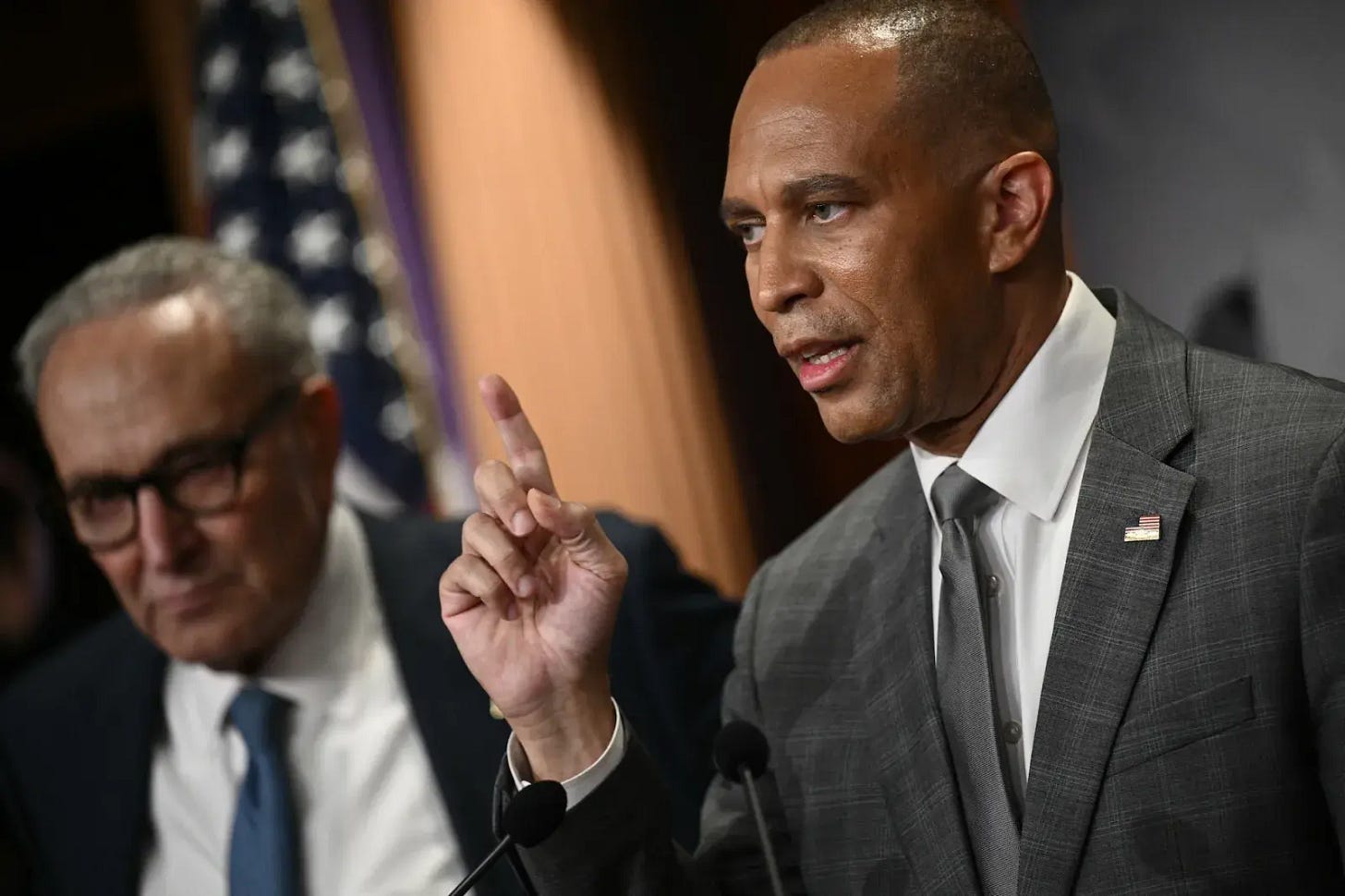The Shutdown Is Going Better Than Expected for Democrats. Will It Last?
My latest article in Newsweek on what the coming weeks could bring [3 min read]
I’m making a BIG push to get the last few paid subscribers I need to get over the “bestseller” line. So for a brief time, paid subscriptions will be $1 a week! Support fresh, interesting, thoughtful analysis. Support independent media. Get articles, livestreams, and pods that are Worth Knowing. Become a paid subscriber by clicking here or on the button below. THANK YOU, and here’s my latest column in Newsweek.
There’s an old joke about a man who thinks he can fly, so he jumps off a skyscraper. As he passes each floor on the way down, he reassures himself, “So far, so good!”
For Democrats, the first two weeks of the government shutdown have gone well. Now what?
When the lights went out on the federal government, I warned that Democrats were running a substantial risk of three negative near-term outcomes: losing the perception battle, distracting from President Donald Trump’s economy-killing tariffs and Epstein file coverup, and handing Trump and his hatchet-man—OMB Director Russell Vought—near-dictatorial power to shred the government further. Yet they had to do it, since an act of painful defiance was the best way to rekindle unity and faith in party leaders ahead of the upcoming midterm elections.
In those terms, Democrats have won the opening round. The perception battle has been a draw so far: polling consistently shows voters blame the parties equally or Republicans slightly more. The distraction has happened, but the chickens will still come home to roost for Republicans: shutdown-delayed (and likely dismal) economic numbers will emerge eventually, and will matter more in the long run. It will be harder to keep a lid on the Epstein files following the recent election of a new member of Congress who represents a majority-making 218th vote in favor of forcing their release. And besides, Trump is in the midst of a deserved victory lap for the Israel-Gaza deal—so he would have sidetracked voters from his deeper problems anyway.
As for Trump’s vindictive layoffs, they’re every bit as awful as his earlier DOGEing of the federal government, and delivered with the same “ready-fire-aim” forethought (the Trump team already had to call back most of the Centers for Disease Control personnel it fired this past Friday). But politically, they’re not hurting Democrats yet, since voters have made it clear that they don’t like this kind of slash and burn.
And Politico reports that Democratic activists have been quietly but pleasantly surprised by their leaders’ show of backbone. There are even mild cracks forming among Republicans. Exhibit A: firebrand Representative Marjorie Taylor Greene, who sided with the Democrats (prompting a baffled Trump to ask “What’s going on with Marjorie,” always an apt question). There’s also the fact that GOP leaders are now backchanneling in search of a health care off-ramp and promising Freedom Caucus members that if they have to cave on a funding deal they’ll make it up with more spending rescissions later.
So far, so good.
But there are two looming problems. One is that the short-term risks aren’t over. Democrats have so far been swaddled in a protective bubble of public apathy. But mounting airline delays, frozen Small Business Administration loans, and busy signals at IRS help lines could pop it. Voters may dislike wanton firings, but they dislike disruptions to their lives even more. Polls in recent days are now showing indications of a slight erosion for Democrats.
The far bigger issue is that sticking the landing was never about the short term. This was always a gambit with an unclear endgame.
There are essentially three ways the shutdown could go.
One scenario is that Republicans force Democrats to fold. Open enrollment for health insurance marketplaces starts on November 1, and without a subsidy extension, premiums will be about 114 percent higher. Democrats think that’s leverage, but Republicans think that if they get the extension done before December 31, consumers will work it out. So they’re betting that the pressure on Democrats from shutdown disruptions will become greater than the pressure on Republicans to extend the subsidies before New Year’s Eve. They could prove right. If so, Democrats could squander much of the credibility that they’ve earned with their activist base.
A second possibility is deviously clever, but remote. Trump could perceive a chance to triangulate against his Freedom Caucus hardliners and say “let’s extend ACA subsidies in exchange for a ‘clean’ funding extension.” This could be a political master stroke: a chance to appear like a savvy dealmaker above the swampy beltway fray, while keeping the back pocket option to withhold or rescind agreed-to funding later. Trump could get everything he wants, and it wouldn’t be a bad outcome for Democrats either. But given his obsession with political retribution, he’s extremely unlikely to see it.
The third is that the Democrats’ gamble pays off—the public stays neutral and the November 1 outcry is too much for Republicans to bear. They would still have much work to do to convert their rediscovered mojo into the political currency of increased voter regard and engagement. But they would have some momentum.
Faceplant or fly away? The coming weeks should tell.


